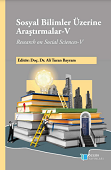Kant’ta Kişilik Mantıksal Yanlış Çıkarımı
The Paralogism of Personality in Kant
Author(s): Fatih Özgökman
Subject(s): Philosophy, Ethics / Practical Philosophy, Identity of Collectives
Published by: Özgür Yayın Dağıtım Ltd. Şti.
Keywords: Personality; Kant; identity;
Summary/Abstract: Leibniz argues that consciousness of one's identity at every moment of time requires a substantial identity of the soul. On contrary Kant qualifies as logically wrong the inference that the identity of the person requires the identity of the soul in time on the basis of consciousness. The reason why an inference is logically wrong is that the middle term is used in a different sense in the premises. However, such a use of the middle term is not seen in personality inference. Moreover, Kant makes three arguments against the identity of the soul. The first is that my consciousness of my identity in time is the same as my consciousness of time. Second is that the identity of the soul cannot be known empirically by an outsider. The third is that it is possible for my consciousness to be carried by different substances. Accordingly, Kant concludes that the identity of the soul as a substance cannot be known. However, Kant's arguments do not seem sufficient to reject the identity of the substance to which my self-consciousness belongs. Because we have a consciousness that we are identical, this consciousness has more informational value than just a thought, and moreover, non-identical substances are not expected to have identity consciousness.
Book: Sosyal Bilimler Üzerine Araştırmalar - V
- Page Range: 231-250
- Page Count: 20
- Publication Year: 2023
- Language: Turkish
- Content File-PDF

